Alarming facts and dire predictions about how food waste is needlessly crippling the human race and our planet.

The issue of food waste has picked up some considerable buzz recently, and rightly so. The problem goes far beyond simply appreciating the food that is in front of you. In fact, food waste–which is any uneaten food or food preparation scraps from residences, businesses, and other institutions–is a serious global economic, environmental, and moral issue. The world population is projected to hit 9.6 billion by 2050. Unless food waste is reduced, we simply will not be able to feed everyone.
But, as morbid as that is, we really aren’t asking all that much of ourselves–in fact, we’ve set the bar incredibly low. According to the United Nations Environment Programme and World Resources Institute (WRI), about one third, or $1 trillion worth, of all the food produced worldwide is lost or wasted in production and consumption. All of that boils down to a loss of about one in every four calories on the planet.
While this is a truly global concern and while a substantial amount of food is wasted in poorer countries, the true culprits, as usual, are the countries with the most money and most food. Sadly, consumers alone (as opposed to producers) in industrialized countries waste 222 million tons of food per year, which is nearly as much as all of sub-Saharan Africa (consisting of 44 countries) produces for consumption.

The world’s largest hamburger weighed 2,000 pounds (one ton).
The United States, neck in neck with all the countries of Europe combined, has climbed its way to the top of the landfill in consumer food waste. If you are privileged enough to have the luxury of overconsumption, try to think about the following things the next time you scan the grocery store aisles or go out to eat:
Food Waste: The Basics
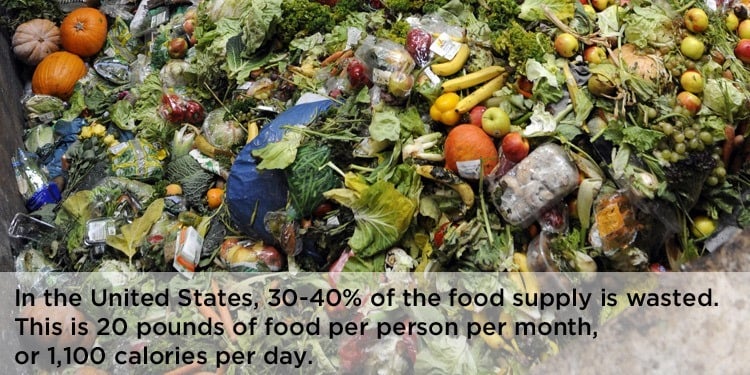
Image Source: The Huffington Post
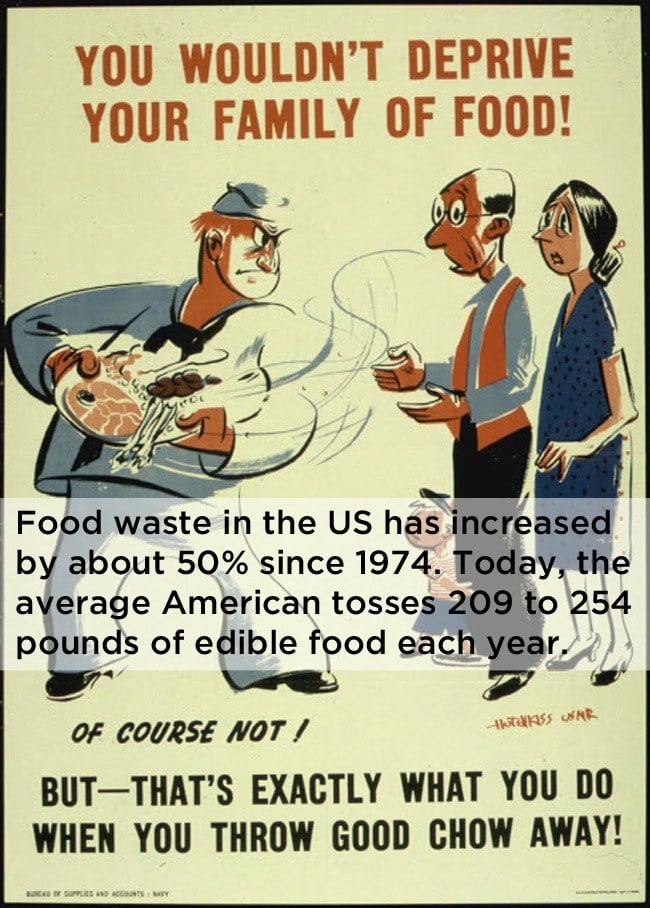
Image Source: Blogspot
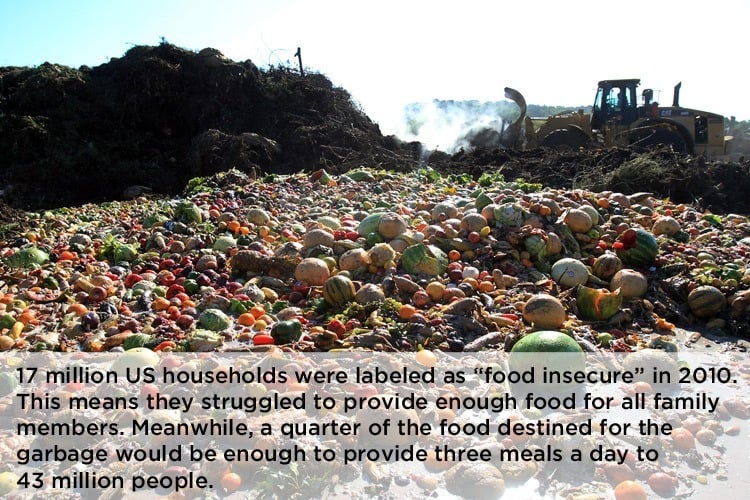
Clearly, we are needlessly wasting an extraordinary amount of food. However, it’s not just the food, but the money, labor, and environmental resources put into the food that is tossed into the garbage as well. California is drying up like a raisin, food production prices are rising, one in seven Americans rely on food stamps, and yet, we are throwing away a huge chunk of food.
Of course, for the most part, it’s not that people are looking at a sandwich they just bought, giving a shrug, then throwing it out in full view of a hungry homeless person. The reality is that yogurt expires, lettuce wilts, grocery stores can’t sell all of their product, or you’re served a little too much pasta when you’re at a restaurant.
It all adds up and it all boils down to the fact that we just aren’t being conscious or efficient in how we buy, store, eat, and dispose of our food. And while our fellow humans are certainly suffering as a result, perhaps it’s our planet that suffers most of all…
Food Waste: The Environment
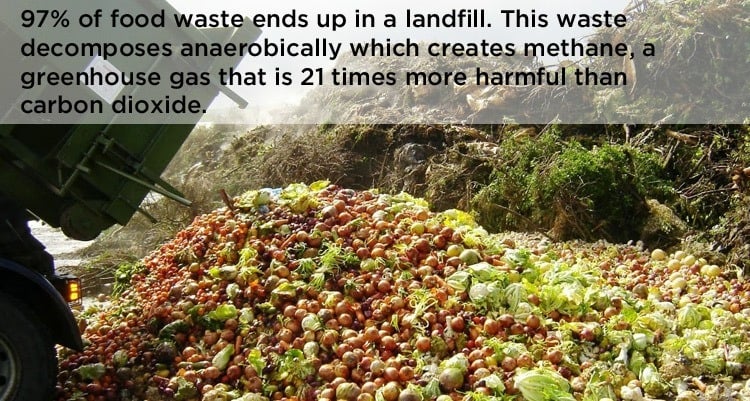
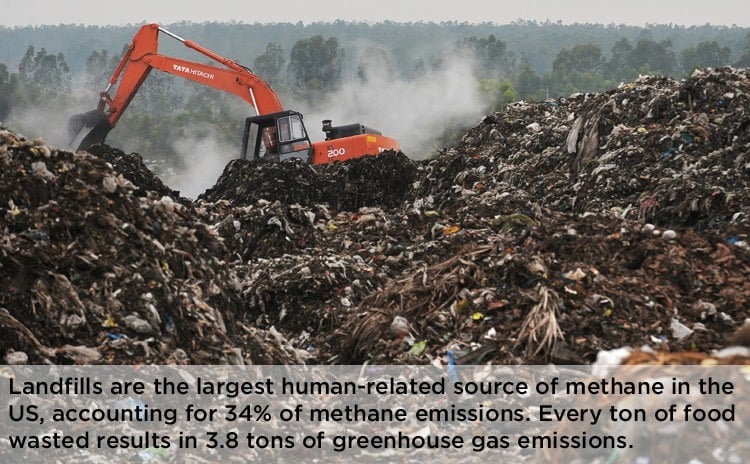
Image Source: MPLS Green
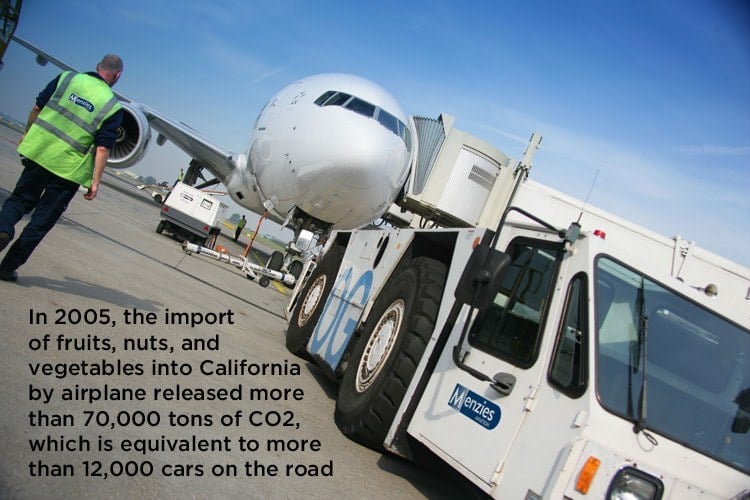
Because we are piling most of our food waste (some of it nearly untouched since the farm) into landfills, by the time the food begins to decompose, it has been buried under mounds of trash. As a result, there is no oxygen for it to use during decomposition, resulting in the creation of massive amounts of methane gas.
In contrast, composting allows for aerobic decomposition and turns the waste into fertilizer, which will help grow more crops. But few states have pushed any public composting programs, so the process is scarcely utilized. In an era of constant technological advancement, it’s puzzling that the environmentally and economically questionable landfill option remains the backbone of our waste management method.
Furthermore, before we even have a chance to waste it, our food is traveling immense distances to get to us. This, of course, burns takes its own serious toll on the environment and burns through serious resources…
Food Waste: The Money
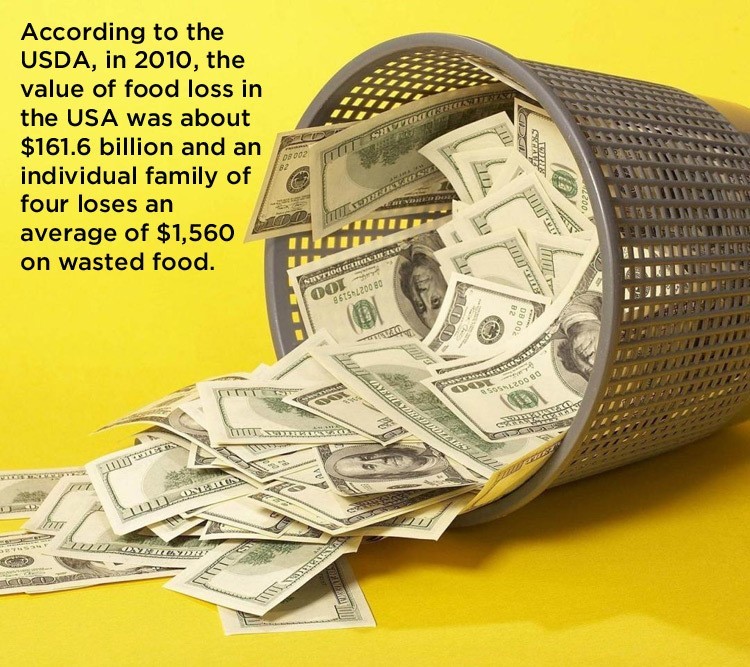
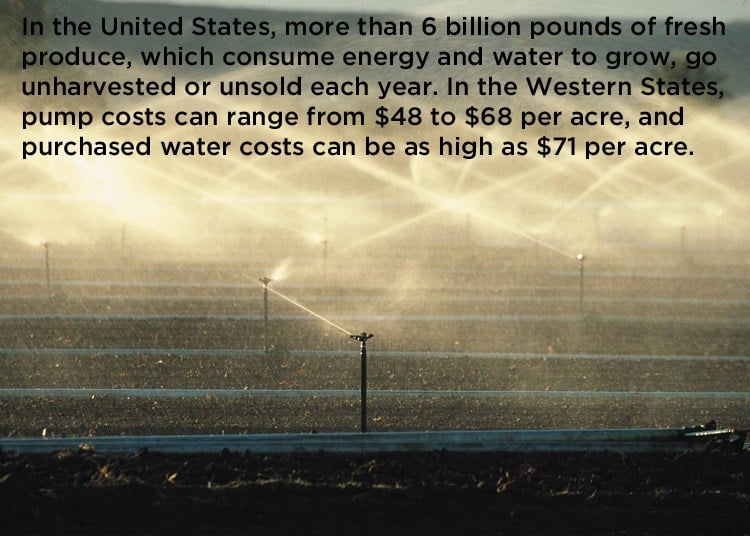
Image Source: FarmsReach
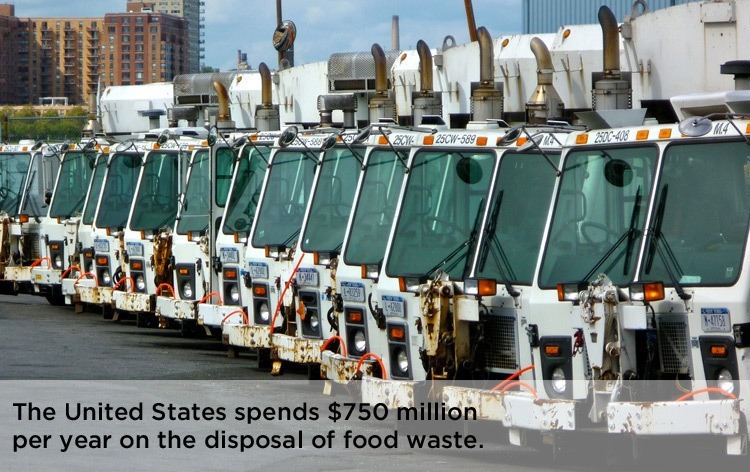
Why, even when their wallets are at stake, would so many companies and individuals waste so much…
Food Waste: The Reasons
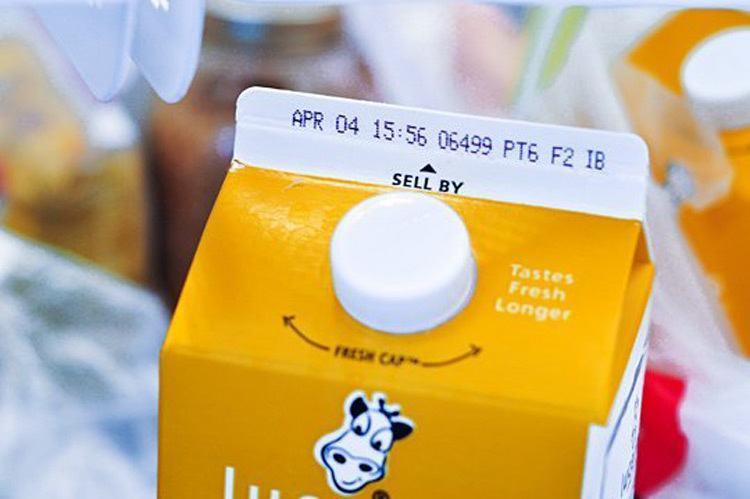
Besides just being more aware of what you buy as a consumer, there are three main reasons so much food and money are wasted between the farm and the table. One is the strict aesthetic grading of food products. Irrespective of the quality of the food, how produce looks–its shape, for example–can have a huge effect on how much farmers are paid for it, or if a store will even buy it at all. We have created an extremely selective market that encourages farmers to discard visually imperfect food because it costs them more than it’s worth to sell it.
The second issue arises from expiration dates. Understandably, grocery stores will not sell expired products and consumers will not buy or eat them. It has recently been revealed, however, that those “sell by” and expiration dates are arbitrary.
There is no official guideline that determines when a product is no longer edible. In fact, the dates are chosen by the manufacturer and reflect their best guess as to when the product will no longer be at its highest quality. Billions of pounds of good food are tossed as a result of these labels.
The third and final issue is that all of this unsold food is thrown out in stores to make room for fresher products, instead of, say, being donated. This, as is the case with expiration dates, is the result of another common misconception.
Food producers and sellers often fear that they will be sued if someone gets sick from food they’ve donated. However, there is actually no such liability. As long as the donation was made in good faith, the individual or business who made the donation is protected by law.
Yet none of this seems to have compelled us to think about how food waste will affect our future…
Food Waste: The Future
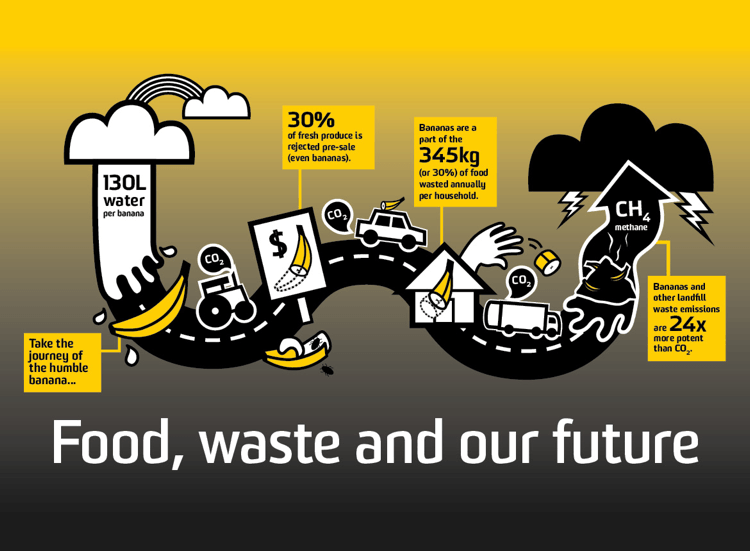
Image Source: ecocreative
There are about 870 million undernourished people living in the world today. And, from farm to table, the amount of food wasted by richer nations adds up to more than the body weight of all 870 million combined. If food waste isn’t reduced to help close this nourishment gap, it is only going to get worse as an additional 2 billion people come into the world over the next 35 years.
Predictions based on our current rate of greenhouse gas emissions show that the year 2050 will also see extreme environmental change. This includes a substantial rise in the average global temperature and shifts in ecosystems, storm patterns, and sea levels.
And methane from food waste is a huge contributor to the greenhouse gas emissions that are causing so many of these problems. Restricting this methane output could have a great impact on the future of our planet. For instance, if the total amount of food wasted each year were composted instead, the resulting greenhouse gas reduction would equal the reduction that would result from taking 2 million cars off the road.
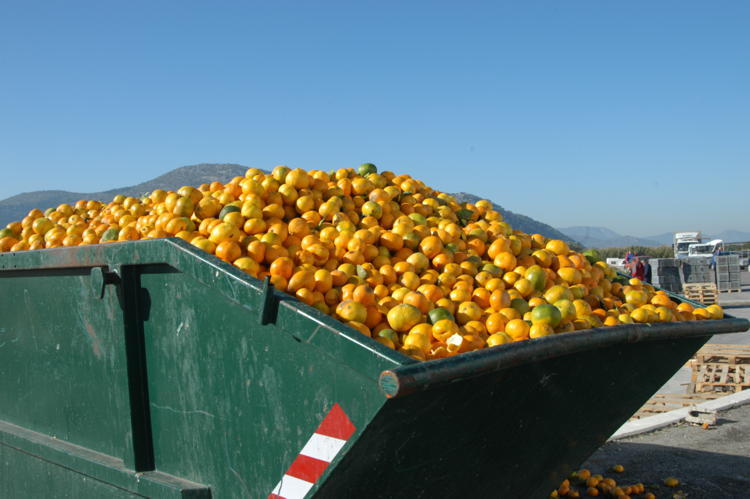
We are not facing a dauntingly unsolvable issue. The U.S. government has at least taken notice. Six weeks ago, the U.S. Department of Agriculture and the Environmental Protection Agency announced the first ever national target for food waste. “[We’re] basically challenging the country to reduce food waste by 50 percent by the year 2030,” Agriculture Secretary Tom Vilsack told NPR.
At the individual level, tackling food waste can be as simple as being smart and aware of what you purchase and throw away. For instance, only buying the food you need at the store, being aware of how quickly you eat certain items, or just buying food for the next few days instead of a week or two. At restaurants, take leftovers home or order a smaller portion. Or, start composting at home.
It really just comes down to being conscious of what you consume. At the very least, perhaps you’ll think twice before throwing away that half-eaten apple.





